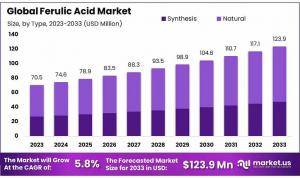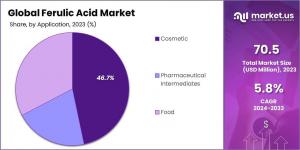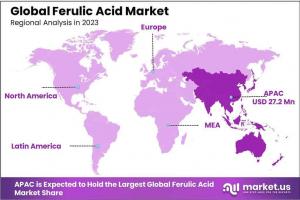Ferulic Acid Market to Reach USD 123.9 Million by 2033, Growing at 5.8% CAGR
Ferulic Acid Market size is expected to be worth around USD 123.9 Mn by 2033, from USD 70.5 Mn in 2023, CAGR of 5.8% forecast period 2023 to 2033.
Across Asia Pacific, especially in countries like China, the Ferulic Acid market holds a significant share, surpassing 38.7%.”
NEW YORK, NY, UNITED STATES, January 24, 2025 /EINPresswire.com/ -- Report Overview— Tajammul Pangarkar
Ferulic Acid is a hydroxycinnamic acid commonly found in plant cell walls, particularly in cereals, fruits, and vegetables. It is a powerful antioxidant known for its ability to neutralize free radicals, stabilize other antioxidants, and protect against oxidative stress. Ferulic acid is widely used in cosmetics, pharmaceuticals, and the food industry due to its anti-inflammatory, antimicrobial, and UV-absorbing properties.
The Ferulic Acid Market is experiencing steady growth, driven by increasing demand across multiple industries, particularly in skincare, dietary supplements, and pharmaceuticals. Rising consumer awareness about anti-aging and skin-protecting ingredients has fueled the adoption of ferulic acid in cosmetic formulations. Additionally, growing research into its potential health benefits, such as cardiovascular protection and neuroprotection, is expanding its application in functional foods and nutraceuticals.
The rising preference for natural and plant-based antioxidants is a key factor driving the ferulic acid market. Consumers are shifting towards organic and plant-derived skincare and food products, leading to increased demand for ferulic acid extracted from natural sources. Additionally, the growing emphasis on clean-label and sustainable ingredients in food, cosmetics, and pharmaceuticals is propelling market expansion.
The cosmetics and personal care sector dominates the demand for ferulic acid, particularly due to its ability to enhance the efficacy of vitamins C and E in skincare products. The increasing prevalence of skin-related concerns, coupled with a surge in anti-aging product demand, is accelerating market growth. Additionally, the nutraceutical industry is witnessing a surge in demand for ferulic acid due to its anti-inflammatory and cardiovascular benefits.
Expanding R&D efforts in pharmaceutical applications presents significant growth opportunities. Ferulic acid's potential in preventing neurodegenerative diseases, cardiovascular ailments, and diabetes is drawing attention from pharmaceutical companies. Additionally, its application in biodegradable packaging and food preservation is an emerging opportunity, as industries focus on sustainable and natural solutions.
The increasing global focus on preventive healthcare and wellness is a primary driver for ferulic acid market expansion. With a rise in consumer spending on functional foods, dietary supplements, and advanced skincare, the market is experiencing strong demand. Moreover, the regulatory push towards natural antioxidants in food preservation and pharmaceuticals is further boosting adoption.
Get a Sample PDF Report: https://market.us/report/ferulic-acid-market/request-sample/
Key Takeaway
• The Ferulic Acid Market is expected to reach approximately USD 123.9 million by 2033 from USD 70.5 million in 2023, showcasing a CAGR of 5.8%.
• Natural Ferulic Acid holds over 61.8% market share in 2023, signifying a strong consumer preference for naturally sourced variations due to perceived organic nature and health benefits.
• Cosmetics claim a substantial 46.7% share, leading in the utilization of Ferulic Acid. Pharmaceutical Intermediates follow suit, showing notable usage. Food applications exist but are less pronounced.
• Across Asia Pacific, especially in countries like China, the Ferulic Acid market holds a significant share, surpassing 38.7%.
Ferulic Acid Market Segment Analysis
By Type Analysis
In 2023, the Natural ferulic acid segment dominated the market with over 61.8% share, reflecting strong consumer preference for naturally sourced ingredients. Derived from plants like rice bran and oats, it is favored over the Synthetic type, which faces lower market penetration due to perceptions of artificiality. This trend aligns with the broader consumer shift toward natural products, driven by health considerations and trust in organic sources.
By Application Analysis
In 2023, Cosmetics dominated the ferulic acid market with 46.7% share, highlighting its widespread use in skincare and beauty products. Pharmaceutical Intermediates followed, utilizing ferulic acid in medication formulations, though to a lesser extent. Food applications also exist, mainly for antioxidant and flavor-enhancing purposes, but remain a smaller segment. Overall, ferulic acid's primary demand stems from the cosmetics industry, with notable yet lower contributions from pharmaceuticals and food.
Buy Now: https://market.us/purchase-report/?report_id=22125
Key Market Segments
By Type
• Synthesis
• Natural
By Application
• Cosmetic
• Pharmaceutical Intermediates
• Food
Top Emerging Trends
1. Rising Demand for Natural Ferulic Acid: Consumers are increasingly choosing natural ferulic acid over synthetic alternatives, driven by a preference for plant-based and organic ingredients in cosmetics, pharmaceuticals, and food. This trend is fueled by growing awareness of clean-label products, sustainability concerns, and trust in naturally derived compounds. As a result, companies are focusing on sourcing ferulic acid from rice bran, oats, and other botanical sources to meet market demand.
2. Expanding Role in Skincare & Beauty: Ferulic acid is becoming a key ingredient in anti-aging and skin-protecting products, with demand soaring in the cosmetics sector. Its ability to stabilize vitamins C and E, combat oxidative stress, and reduce signs of aging has made it popular in serums, creams, and sunscreens. This increasing usage, along with consumer interest in scientifically backed skincare, is driving innovation in cosmetic formulations.
3. Growing Adoption in Pharmaceuticals: The pharmaceutical industry is exploring ferulic acid’s potential health benefits, including its anti-inflammatory, cardiovascular, and neuroprotective properties. Research is expanding its role in preventing conditions like Alzheimer’s, diabetes, and heart disease. This has encouraged pharmaceutical companies to develop new formulations using ferulic acid, boosting its market presence in the nutraceutical and drug development sectors.
4. Increased Use in Functional Foods: Ferulic acid is gaining traction in functional foods and dietary supplements, thanks to its antioxidant and anti-aging properties. It is used to enhance food preservation, prevent oxidation, and support immune health. With consumers prioritizing health-conscious eating, brands are incorporating ferulic acid into food products, energy drinks, and fortified supplements to offer additional health benefits.
5. Sustainable and Green Extraction Methods: Sustainability is shaping the ferulic acid market, with a focus on eco-friendly extraction techniques. Companies are investing in biotechnological advancements, enzymatic extraction, and waste-reducing processes to obtain ferulic acid from natural sources more efficiently. This aligns with global efforts to minimize environmental impact, improve production efficiency, and cater to consumers seeking sustainable ingredient sourcing.
Regulations on the Ferulic Acid Market
Ferulic acid, a hydroxycinnamic acid prevalent in plant cell walls, is utilized in various industries, including food preservation, cosmetics, and pharmaceuticals. In the United States, the Harmonized Tariff Schedule classifies ferulic acid under subheading 2918.90.4300, which pertains to carboxylic acids with additional oxygen functions. This classification imposes a 10% ad valorem duty on imports.
In India, ferulic acid is available through multiple suppliers, such as Sisco Research Laboratories, which offers it with a purity of 98%. The chemical is listed under HSN code 29153999, indicating its categorization within the Indian trade system.
Globally, China is the leading exporter of ferulic acid, accounting for approximately 31% of export shipments. The United States follows with an 11% share, while India holds the fifth position with about 5.5% of global exports.
Safety data sheets, such as those from Tokyo Chemical Industry, classify ferulic acid with hazard statements H315 and H319, indicating it can cause skin and serious eye irritation. Consequently, appropriate handling and safety measures are mandated across jurisdictions.
While specific regulations for ferulic acid may vary by country, its use in consumable products often subjects it to broader chemical safety laws. For instance, in the U.S., the Toxic Substances Control Act (TSCA) governs chemicals like ferulic acid, requiring compliance with reporting, record-keeping, and testing mandates.
Regional Analysis
The Ferulic Acid market is robust in Asia Pacific, particularly in China, where it holds over 38.7% of the market share due to the rapid industrial expansion. In contrast, the U.S. market is growing steadily at a 2.4% annual rate, driven by strict wastewater regulations, notably in power generation.
China's focus on reducing heavy metal levels in water further boosts its demand for Ferulic Acid in water treatment applications. These regional differences highlight the diverse industrial needs and regulatory environments shaping the Ferulic Acid market globally.
Key Players Analysis
◘ Ankang
◘ Cayman Chemical Company, Inc.
◘ CM Fine Chemicals GmbH
◘ Delekang
◘ Healthful International
◘ Hubei Yuancheng
◘ Hunan Huacheng Biotech, Inc.
◘ Leader
◘ Okayasu Co., Ltd.
◘ Oryza Oil & Fat Chemical Co., Ltd
◘ Shanghai Bettersyn Biotech
◘ Sisco Research Laboratories Pvt. Ltd.
◘ Suzhou Leader Chemical Co., Ltd.
◘ Tateyamakasei
◘ Top Pharm Chemical Group
◘ TSUNO CO., LTD.
◘ Xian App-Chem Bio (Tech) Co., Ltd.
◘ Yuansen
◘ Zhejiang Delekang Food Co., Ltd.
Recent Developments Ferulic Acid Market
— In 2024, Sisco Research Laboratories Pvt. Ltd. delivered more than 8000 products and 20000 SKUs to the scientific community in more than 100 countries, demonstrating their extensive global distribution.
Strategic Initiatives
— Product Portfolio Expansion: Companies are investing in R&D to develop advanced formulations that meet regulatory and consumer demands.
— Geographic Expansion: Focus on high-growth regions like Asia-Pacific and the Middle East to capitalize on industrialization trends.
— Sustainability Initiatives: Efforts to align with global sustainability goals and minimize environmental
Lawrence John
Prudour
+91 91308 55334
Lawrence@prudour.com
Visit us on social media:
Facebook
LinkedIn
Legal Disclaimer:
EIN Presswire provides this news content "as is" without warranty of any kind. We do not accept any responsibility or liability for the accuracy, content, images, videos, licenses, completeness, legality, or reliability of the information contained in this article. If you have any complaints or copyright issues related to this article, kindly contact the author above.



